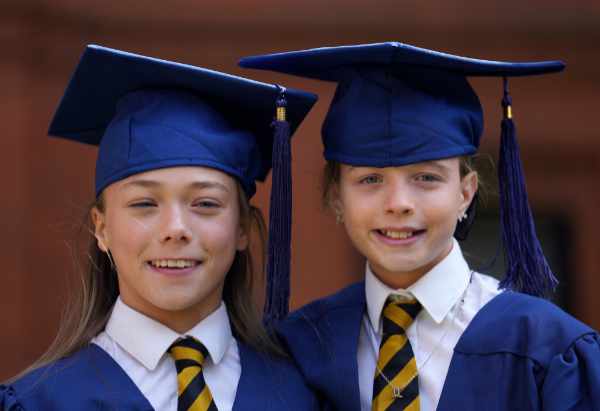Nearly 600 Primary 7 pupils from 15 Glasgow schools have ‘graduated’ from a special University of Strathclyde widening participation initiative.
Graduation ceremonies for the Young Strathclyder programme, held in the Barony Hall on Wednesday 5 and Thursday 6 June, saw pupils wearing gowns and mortar boards taking to the stage, being ‘capped’ and receiving a certificate of achievement.
The Young Strathclyder programme is aimed at raising the aspirations of pupils from disadvantaged backgrounds and supporting their educational attainment and learning opportunities.
A total of 1,273 pupils from P5-P7 took part in the Young Strathclyder Primary programme this year from Annette Street, Bankhead, Carntyne, Chirnsyde, Cranhill, Cuthbertson, Dunard, Glendale, Miller, Oakwood, St Benedict’s, St Patrick’s, St Rose of Lima, St Timothy’s and Wellshot.
Sense of belonging
The Primary programme sees pupils take part in a range of engaging and interactive educational activities, designed by staff across the University’s four faculties – Strathclyde Business School, Science, Engineering and Humanities & Social Sciences – helping them to build a sense of belonging and confidence within a Higher Education setting.

This year’s activities saw pupils making nanopolymer bouncy balls, rewriting a computer algorithm, understanding what makes a good curriculum vitae and analysing poetry to write a song.
The pupils were supported by Strathclyde student mentors, many of whom are from widening access backgrounds themselves and some of whom work as mentors as part of their Management Development Programme in the Strathclyde Business School.
Professor Sir Jim McDonald, Principal & Vice-Chancellor of Strathclyde who presided over one of the ceremonies, said: “At Strathclyde we are committed to being a socially progressive University that is open to all. We want to ensure those who can benefit from a university education have the opportunity to do so, regardless of where they come from or their economic means.
“As someone who was the first person in my family to go to university, I am delighted to see so many schools and young people engaging with our Young Strathclyder programme with such enthusiasm. I know the pupils, their families and teachers have found the experience inspiring.”
Educational journey
Pupils receive credit for completing activities as they progress through the different levels of the Young Strathclyder programme: Primary, S2 and Accelerate for S5 and S6. These three main stages of the programme are designed to coincide with key stages in the pupils’ educational journey, providing them with a continuum of engagement and support from the University.
Eight secondary schools took part in the Young Strathclyder S2 programme this year – Castlemilk, Eastbank, Knightswood, Lochend, Shawlands, Smithycroft, St Andrew’s and St Roch’s – which saw pupils attend the Strathclyde campus for a day, taking part in activities that offer them an in-depth look at University with a greater focus on particular subject areas in which they may be interested.
Later in June, 350 S5 and S6 pupils from widening access backgrounds will be on the Strathclyde campus for the week-long Young Strathclyder Accelerate programme, which allows them to focus specifically on a subject-area they may want to study at University.
Significant impact
Student mentor Lauren Rafferty, a third year Management Development Programme Business Student, said: “The Young Strathclyder programme has a very significant impact on the pupils. There has always been a stigma around university of it being only for certain people, but of course this is untrue and is open for everyone no matter the background.
“This programme informs pupils that university can be a place for them and that it can be great fun and exciting and opens many opportunities for them.
“I have thoroughly enjoyed my time working as a mentor for Young Strathclyder. I most enjoyed being able to share with the students my university experiences and the opportunities I have had across my five years of university.”
“I loved hearing the different aspirations and interests the pupils had and just generally engaging with them getting to know them as people and connecting with them.”